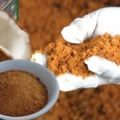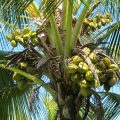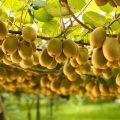People are becoming more conscious in using food products that are not only healthy but are also natural and organic. This is the reason why the demand for coconut sugar has been on a steady rise since it was first introduced to the public’s eye.
The advantage of coco sugar is its low Glycemic Index (GI) compared to the conventional table sugar that is often sold in the market. Coco sugar is the ideal alternative sweetener for people with diabetes.
The Bureau of Agricultural Research (BAR), through its National Technology Commercialization Program (NTCP), has been funding various research and development (R&D) initiatives in support to the product development and promotion of coco sugar.
As early as 2006, BAR in partnership with the Philippine Coconut Authority (PCA) embarked in a project that will boost coco sugar as an income-generating enterprise for village-level production. Through the support of BAR, the production process of coconut sap sugar was standardized and the product characterized. The project fine-tuned the technology and developed the protocol for coconut sap sugar production.
Through the project, a women’s group called the “Aroman Natural Food Producers Multipurpose Cooperative” was established in North Cotabato. The Cooperative applied their coconut sap sugar for Organic Certification to further boost the quality of the product commanding a high demand both globally and locally.
With the great potential of coco sugar and its increasing demand in the market, BAR embarked on another project to further intensify the promotion of coco sugar. In 2012, BAR partnered with the Quezon Agricultural Research and Experiment Station (QARES) and the local government unit (LGU) of Quezon to implement the project titled, Production, Promotion, and Commercialization of Coconut Sap Sugar in the Province of Quezon”.
The project aimed to increase the coconut farmers’ income, create employment, and sustain the coconut industry as the municipality’s major source of income. The project was able to establish technology demonstrations sites for coconut production, and later on expanded these sites outside the municipality.
Farmers were also capacitated through the conduct of trainings on production, technology transfer, and value-addition of coconut sap sugar production.
Currently, the project team is able to increase its production volume and improved the quality of product development.
The project has resulted to a significant increase in the income of the farmers, of which one farmer-cooperator earned an average gross yearly income of PhP 877,500 from coco sap sugar production alone. (Patrick Raymund A. Lesaca and Rita T. dela Cruz, DA-BAR)







